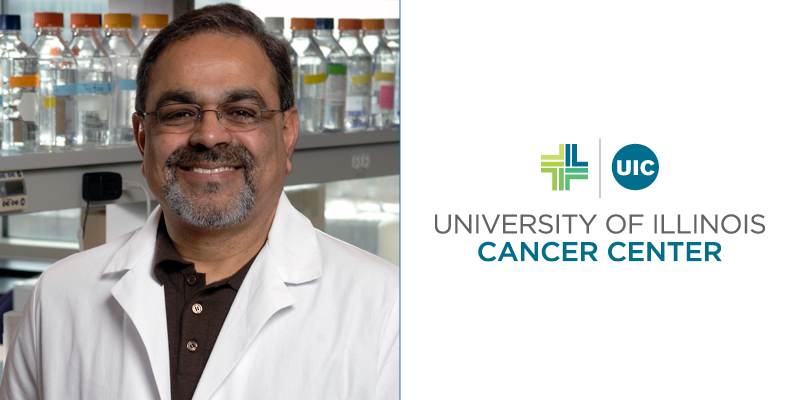
Many members of the University of Illinois Cancer Center are helping battle COVID-19, whether it’s through donations of personal protective equipment or volunteering their time and talents through other means.
The University of Illinois at Chicago and Vanda Pharmaceuticals are partnering to investigate small molecules that may have the potential to treat the novel coronavirus, COVID-19. University of Illinois Cancer Center member Bellur S. Prabhakar, MSc, PhD, professor of microbiology and Immunology and Senior Associate Dean for Research at the University of Illinois College of Medicine, will serve as the principal investigator.
The collaboration will include the use of a high-throughput screening assay to identify small molecules that prevent cathepsin-L cleavage of SARS-CoV-2 (COVID-19) glycoproteins that are required for viral processing of the host cell, according to a press release from Vanda Pharmaceuticals, a leading global biopharmaceutical company focused on the development and commercialization of innovative therapies to address high unmet medical needs and improve the lives of patients. The company’s headquarters are in Washington, D.C.
“We can readily deploy the high-throughput screening we had developed to successfully screen for small molecules that specifically inhibited cathepsin-L mediated cleavage of SARS (Severe Acute Respiratory Syndrome), Ebola, Hendra and Nipah derived proteins, and entry of pseudotyped virus into cells,” said Prabhakar, a member of the UI Cancer Center’s Translational Oncology Program. “Given the similarity between SARS-CoV and COVID-19, we expect to identify potential drug candidates to treat COVID-19 infection.
“This partnership with Vanda, in collaboration with the UIC’s Center for Drug Discovery and Development, led by Dr. Gregory Thatcher, and High-Throughput Screening Core, led by Dr. Kiira Ratia, will bring together complementary expertise to potentially speed up drug discovery.”
Thatcher, PhD, Hans W. Vahlteich Chair of Medicinal Chemistry in the University of Illinois College of Pharmacy, serves as co-leader of the UI Cancer Center’s Translational Oncology Program.
SARS-CoV-2 and other viruses depend on cathepsin L for processing in-target cells. The viral glycoproteins need to be primed by protease cleavage, activating them for fusion with the host cell membrane. Previous research has demonstrated the potential of small molecules to inhibit the cathepsin L cleavage of viral peptides with minimal inhibition of physiological substrate cleavage.
Mihael H. Polymeropoulous, MD, president and chief executive officer of Vanda, said the company is looking forward to the partnership with UIC, as it will “enhance our efforts to bring new treatments to patients.
“Our collaboration will enhance our efforts to bring new treatments to patients, and further propels Vanda’s recently launched COVID-19 therapeutics program that includes multiple molecular approaches in therapeutics development,” Polymeropoulous said in the release.
